| Srl | Item |
| 1 |
ID:
064547
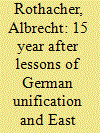

|
|
|
| 2 |
ID:
062165
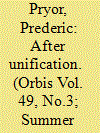

|
|
|
| 3 |
ID:
015376
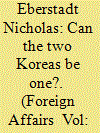

|
|
|
|
|
| Publication |
Winter 1992-93.
|
| Description |
150-165
|
|
|
|
|
|
|
|
|
|
|
|
|
|
|
|
| 4 |
ID:
098763
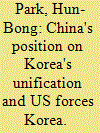

|
|
|
| 5 |
ID:
062545
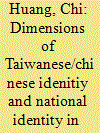

|
|
|
|
|
| Publication |
Feb-Apr 2005.
|
|
|
|
|
|
|
|
|
|
|
|
|
|
|
|
| 6 |
ID:
068694
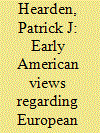

|
|
|
| 7 |
ID:
072162
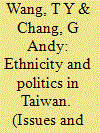

|
|
|
| 8 |
ID:
085663
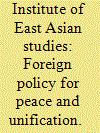

|
|
|
|
|
| Publication |
Seoul, The institute for East Asian studies, 1972.
|
| Description |
199p.
|
|
|
|
|
|
|
|
|
|
|
|
Copies: C:1/I:0,R:0,Q:0
Circulation
| Accession# | Call# | Current Location | Status | Policy | Location |
| 020102 | 327.1/INS 020102 | Main | On Shelf | General | |
|
|
|
|
| 9 |
ID:
108576
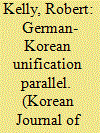

|
|
|
|
|
| Publication |
2011.
|
| Summary/Abstract |
This paper plots the greater difficulties of future Korean unification through a
comparison with Germany 1989/90. The balance of forces favors a more politicized,
more expensive, and more internationally contested Korean unification course
than in Germany. Domestically: there are more North Koreans than there were
East Germans, and they are much poorer. There are fewer South Koreans than
there were West Germans, and they are less wealthy also. South Korea's state
strength or capacity is lower than West Germany's was, while North Korea is a
semi-failed state, even by East German standards. So, fewer people with a lower
GDP per capita in a weaker system will support more people with less wealth from
a worse system. Internationally: today's external patron (the United States) of the
free Korean half is weakening, while the external patron (China) of the communist
half is strengthening. The opposite was true of the United States and West Germany,
and the Soviet Union and East Germany, in 1989. Today's northern patron (China)
is trying to push further into the Asian continent, while yesterday's eastern patron
(the Soviet Union) was looking for an exit from central Europe. Chinese peninsular
intervention is therefore easier, while U.S. support for South Korea's unification
terms will be more difficult.
|
|
|
|
|
|
|
|
|
|
|
|
|
|
|
|
| 10 |
ID:
097682
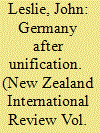

|
|
|
| 11 |
ID:
016013
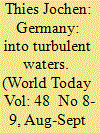

|
|
|
|
|
| Publication |
Aug-Sept 1992.
|
| Description |
148-151
|
|
|
|
|
|
|
|
|
|
|
|
|
|
|
|
| 12 |
ID:
016018
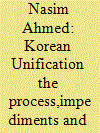

|
|
|
|
|
| Publication |
Jan 1993.
|
| Description |
45-66
|
|
|
|
|
|
|
|
|
|
|
|
|
|
|
|
| 13 |
ID:
074623
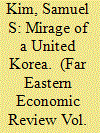

|
|
|
|
|
| Publication |
2006.
|
| Summary/Abstract |
Samuel S. Kim, adjunct professor and senior researcher at the Weatherhead East Asia Institute, Columbia University, reveals sobering details of what Korean reunification might mean for the divided peninsula and the world.
|
|
|
|
|
|
|
|
|
|
|
|
|
|
|
|
| 14 |
ID:
062547
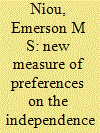

|
|
|
|
|
| Publication |
Feb-Apr 2005.
|
|
|
|
|
|
|
|
|
|
|
|
|
|
|
|
| 15 |
ID:
193139
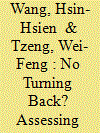

|
|
|
|
|
| Summary/Abstract |
This paper collects and analyzes the speeches of top Chinese leaders on Taiwan, the relevant remarks of Taiwan-related ministries and commissions, and important documents concerning Taiwan. It takes the visit of U.S. House Speaker Nancy Pelosi to Taiwan as an example to observe China’s current policy toward Taiwan and its intent to employ force. This paper argues that although the outside world has repeatedly emphasized that “Taiwan is the most dangerous place on earth” and that China will invade Taiwan by force, peaceful unification is still the main axis of its strategy toward Taiwan. Military force is an avenue for China to force unification and prevent international interference in the Taiwan issue. The results of our analysis of Taiwan-related remarks by top Chinese leaders and relevant ministries and commissions are also highly consistent with the political report of the 20th Party Congress, and there are two noteworthy points. First, China has linked “opposing independence” with “opposing interference by external forces” and the principle of “never renouncing the right to use force over Taiwan.” From Beijing’s perspective, the Taiwan issue is no longer one simply involving cross-strait relations but is embedded in China’s domestic national rejuvenation and the strategic competition between itself and the United States. Moreover, Xi Jinping is the most critical factor affecting cross–strait relations. As a strong leader with a historic mission, how Xi regards the Taiwan issue will affect both the destiny of Taiwan and the security of the entire Asia-Pacific region.
|
|
|
|
|
|
|
|
|
|
|
|
|
|
|
|
| 16 |
ID:
090514


|
|
|
|
|
| Publication |
2009.
|
| Summary/Abstract |
Increasingly, a unitary view of war is becoming the 'gold standard' for which armed forces should prepare. Institutional flexibility is essential in identifying the character of each conflict, and the potential changes within it, thereby influencing doctrine, training and defence spending. The current U K defence structures concerned with the development, assimilation an d application of ideas about war are stove-piped, however, and do not relate to this unitary view of war
|
|
|
|
|
|
|
|
|
|
|
|
|
|
|
|
| 17 |
ID:
066882
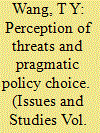

|
|
|
| 18 |
ID:
163781
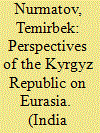

|
|
|
|
|
| Summary/Abstract |
The Kyrgyz Republic was a co-founder of the Shanghai Cooperation Organisation (SCO) and the Commonwealth of Independent States (CIS), one of the first countries to sign the Collective Security Treaty (CST). Participation in the Treaty is a guarantee of its own security for Kyrgyzstan. The Eurasian Economic Union (EAEU), becoming the culmination of the formal economic integration of Russia and Central Asian countries, set as its primary goal the creation of common regional markets for goods, services, capital and labour, which implies unrestricted freedom of trade and labour migration between member countries and unified customs procedures. The participation of Kyrgyzstan in the EAEU is a historically conditioned need for the revival and strengthening of trade and economic ties. Kyrgyzstan’s road, rail and air links mainly pass through the EEU countries.
|
|
|
|
|
|
|
|
|
|
|
|
|
|
|
|
| 19 |
ID:
127624
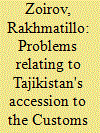

|
|
|
|
|
| Publication |
2013.
|
| Summary/Abstract |
This article attempts to analyze the organizational, political, economic, and legal problems associated with the Tajikistan's accession to the Customs Union, the establishment of which is objectively important with respect to its aims, functions, and potential for achieving the projected results. In so doing, it focuses mainly on the Custom Union's regulatory and legal framework.
The article presents the results of an analysis of the prerequisites, consistent patterns, and consequences of Tajikistan's accession to the Customs Union; they have been expressed in some of the theoretical conclusions and practical proposals.
|
|
|
|
|
|
|
|
|
|
|
|
|
|
|
|
| 20 |
ID:
064239
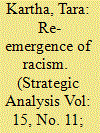

|
|
|